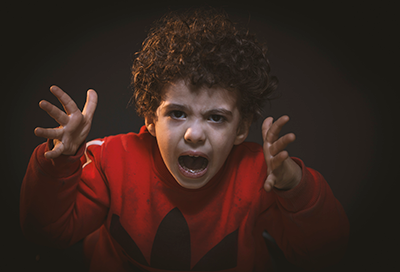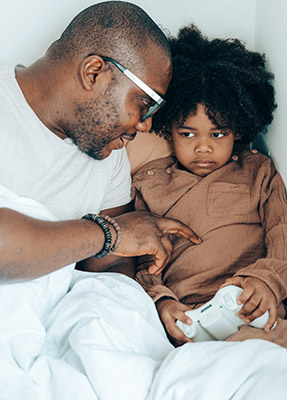Helping Children Manage Emotions
# teaching calm
 Teaching Children Calm
Teaching Children Calm
Tantrums, outbursts, fighting and defiance, if you have children, you have probably experienced these moments more often than not. While some of these types of emotions are learned behavior on the child's part to get what they want, for many these are all powerful emotions or feelings they are experiencing and furthermore, can’t control.
So what we are really dealing with in this later senario are what we call, dysregulated emotions. The good news is that all hope is not lost and things don't “just have to be this way”, coping skills can be taught and learned to change those dysregulated emotions to regulated ones.
While doing my counseling and psychology coursework in college my concentration of study was in child and family. I later worked for a few years with just children, adolescence and the family dynamics. What I find is that we as adults often forget that children don't come pre-programed with emotions and coping skills, not only are these things learned, but a child's brain is still developing well into young adulthood, around age 24, so they often do not have the ability to fully understand reasoning and problem solving. In addition, many parents may not know themselves, never being taught properly, how to identify and cope with emotions fully. So how can they teach their children if they themselves are not fully equipt?
It's no one's fault, it’s an unfortunate domino effect passed down from generation to generation. We know more these days about mental health and the good news is, it's not too late to help equip yourself and your children (and effectively future generations). You can put into place those teachings and skills to help not only your children grow up with a better mental health understanding and coping, but also they will be able to help their children or even peers.
A Little Reminder About Our Nervous System's Role
Before we move on I need to go backwards a bit to make mention of our Autonomic Nervous System and the part it plays in our emotional regulation. To cover the basics our Autonomic Nervous System has the Sympathetic Nervous System (SNS) which is in charge of our flight, fight response. It's the part that increases our heart rate and readies us to either flee from danger or stay and fight it out. The SNS will kick in even when a real danger threat is not there. Maybe you are scared of a situation, nervous or worried about something or someone, all encounters will sound the stress alarms just as it would if you were being chased by a tiger, and the SNS will start its job of protecting you. Staying in this response mode (dysregulation), will have individuals experience chronic stress and anxiety.
On the other end we have the Parasympathetic Nervous System (PSNS), which is in charge of rest and digest, or our calm state. When emotions are regulated, individuals are generally down in this zone and their body will experience a lower heart rate, normal breathing and an overall feeling of calm.
Normally we are moving in between these two systems with no real concern, it's when emotions get out of control or dysregulated that we enter that SNS state. Staying in this zone too long (a chronic stress response), your body will take over and plummet you beyond PSNS where the vagal nerve takes over and shuts down your body to a deep rest, this is where depression resides.
Learning how to identify the emotions you are feeling, and learning how to regulate those dysregulated emotions will be key to keeping ourselves in the “regulation zone”. How do you keep in this zone?, through personal understanding, building resilience and learning coping skills.
 So What Is Dysregulation?
So What Is Dysregulation?
Some children feel things more intensely and quickly, and they’re often slower to return to a calm state. Unusually intense feelings can also make a child more prone to those impulsive behaviors like tantrums and outbursts.
When kids are overwhelmed by emotions or intense feelings, it's generally because the emotional side of the brain isn’t communicating with the rational side. The rational side normally regulates emotions and plans the best way to deal with a situation (problem solving). When you have a child who is experiencing a dysregulated moment, It’s not effective to try to reason with a child at that time. It’s best to wait until the child calms and their rational abilities are back “online”, so that you can now sit down to discuss what happened.
This is also the opportunity to help educate the child on how to deal with or regulate their emotions in the future. Discuss what they were feeling, ask why they felt that way. Help them work through the moment and assist in giving them the coping skills with suggestions as to what they can do the next time they may experience that emotion, or situation.
If you find yourself talking to your child about something they have already previously been spoken to about, remind them of their skills they can use. As with everything, learning new skills takes time, be kind and gentle with little ones who are still learning those new skills to cope with big emotions.
Understanding Emotions
Parents can help children understand what emotions are and more importantly, how their emotions work. Children generally don’t go from calm to sobbing on the floor in an instant. When/if that happens, know there is generally an emotion that has been experienced and they do not understand why they are experiencing it, or better yet, how to handle it.
I hear parents saying all the time, “but they are too young to understand”. To this I say, children are not too young to notice and label their feelings, parents just need to make sure to use language that is appropriate for the age. Yes, young children are not going to understand the words of “Anxiety” or “Stress Response”, they will however understand words like “mad”, “scared”, or even the phrase, “my tummy feels upset”.
Childhood is about learning. Children learn through visual observations and by verbal directions/commands. Emotions and how we handle them is something that should be taught along with how to brush our teeth, wash our hands, or pick up our toys after we are done. Mental health becomes a topic most want to ignore, whether it is themselves feeling like they don't know enough, or a subject matter that is still taboo for many to talk about.
Some children are even hesitant to acknowledge negative emotions. A lot of children are growing up thinking emotions like anger and sadness are bad emotions, mainly because we have put a negative label to them (and others). “Don’t cry”, “Don’t be mad”, children hear a lot of “Dont’s” and get the message that they are not allowed to feel a certain way, and when they do, they don't know how to handle it because they think it is wrong. Understanding, naming and accepting emotions is a foundation to problem-solving and more importantly, how to manage or “regulate”emotions when needed.
Parents may also minimize negative feelings, because they want their kids to be happy. But children need to learn the reality in that we have a range of feelings. Parents, you are not doing your children any favors by minimizing or pretending an emotion is not happening. It's best to use these moments as teaching opportunities. Allow the emotional moment to pass, allow the child to return to calm and is in a place where you can go over what they may have been experiencing, look at the why and help them learn what they can do (in the way of a coping skill), if this “feeling” happens again.
 Model Managing Difficult Emotions
Model Managing Difficult Emotions
I remember hearing the phrase “children learn what they live”. Children are little sponges and they are learning by observation most times. We don't verbally teach our children to jump to negative behaviors like hitting or name calling, but yet they often possess these things in the face of anger, Why?, because that is what they learned through observation of their environment.
So instead of hiding your emotions or allowing them to get the better of you. Allow yourself for a teaching moment. “Sorry, mommy/daddy is just feeling a little angry right now because she/he forgot to …..”. Again using age appropriate dialouge for young child vs. a teen. Discuss/name your emotion (frustration, sad, tired), give the reasons why and then allow your child to hear you strategize about how you’re going to handle it. Children can now learn from you how they might be able to handle their emotions too in a positive or productive way.
It's ok to allow your children to see you in a less than perfect moment, that's true life. And as much as we want to protect our children from feeling emotions, it's just not reality. The reality is, they will grow and have their own life experiences, and that includes a whole lot of emotions. What we can do as parents, is help equip them early with the tools they need to handle emotions, so they can have an easier time dealing with life challenges later.
 Validation
Validation
Validation is a powerful tool for helping kids calm down, by communicating that you understand and accept what they’re feeling. Acceptance here really means that you are acknowledging that they are feeling a particular way. It should be noted that accepting and acknowledging in this situation is not the same as agreeing.
That said, just because you don't agree with the way they are feeling or how they handled a particular emotion/situation, doesn’t discount that they are feeling the way they are. Its ok to acknowledge by saying “I understand why you are angry and why you lashed out ”, but then also teach them how they could better handle the situation next time instead of choosing the "lash out" response. Again, just remember age appropriate words/discussion depending on if you are talking to a 6 year old vs. a 14 year old.
This is also called effective validation, which means paying attention to your child to understand his/her perspective. It’s ok to reflect back and ask, “this is what I am hearing you say, am I right?” If they say “no”, then ask them to explain some more and assure them you are trying to understand, as sometimes they may feel frustrated that you are not understanding, but remember that they also may not be in a proper mindframe to explain, so sometimes taking a little break and coming back to the “understanding” part, can be helpful and more productive.
In addition to validation, also remember to praise or give positive recognition. When helping your child deal with an emotion, notice the efforts to calm down, however small. For example, if your child is in the midst of a tantrum and you see him take a deep inhale/ breath, you can say, “I like that you took a deep breath”, and join them in taking additional deep breathes to work through their emotional moment. This becomes a positive reinforcement that lets the child know that they employed a good technique and step towards regulation. They will then understand that this is something they can continue to use in the future.
Coping Adhead of Time
I tell all my clients (regardless of their age), “if you know you are going to be going into a situation where a stress response or negative emotion may happen, prepare ahead of time, make a plan so that you can limit the effects”, children are no different. If you know you are going into a situation that may be an emotionally challenging situation for your child, talk and plan ahead of time.
Some situations are unavoidable so help your child know what to expect and discuss what they might feel and furthermore, strategize with them what they are going to do if “X” happens. Sometimes just knowing ahead of time and knowing they have a plan, will take some of the stress off from the beginning and in some cases they may not need to employ anything, simply because they were aware (and prepared) ahead of time.
Problem Solving
It’s natural to want to put tantrums or uncomfortable situations behind us, but in order to help our children learn, we have to help them confront those “icky” moments. Revisiting unpleasant events engages children in thinking about what happened, and helps them to strategize or problem solve about what could have been done differently. If you can help them come up with one or two things that might have led to a different outcome, your child might remember them next time they’re starting to feel overwhelmed or confronted in the same nor similar situation.
 In The End
In The End
Stress, overwhelm and dysregulated emotions, they are not just reserved for adults. We have to remember that these are human emotions and that means all humans, no matter what age. The thing to remember is that children are experiencing these emotions and generally are too young to understand what they are experiencing. They do not have the understanding or skills needed to work through their stress responses and emotions.
As parents, one of our jobs is to help teach our children, this includes emotional work, done through our words and actions. Understanding and regulating our emotions is hard, even for adults, but for children it can be especially scary and confusing. As parents it can be a challenging and uncomfortable time, because in some cases parents may be lacking the skills needed themselves. It's ok to reach out and get help if/as needed.
In the end we are all trying to do our best raising our children and even ourselves for that matter. For our children, we have the opportunity to help set them up now with the understanding and skills needed to equip them for their future. While we all want our children to live happy lives, we know they are going to have their share of life challenges. In the end when all is said and done, just remind them that...... “I love you no matter what”.
